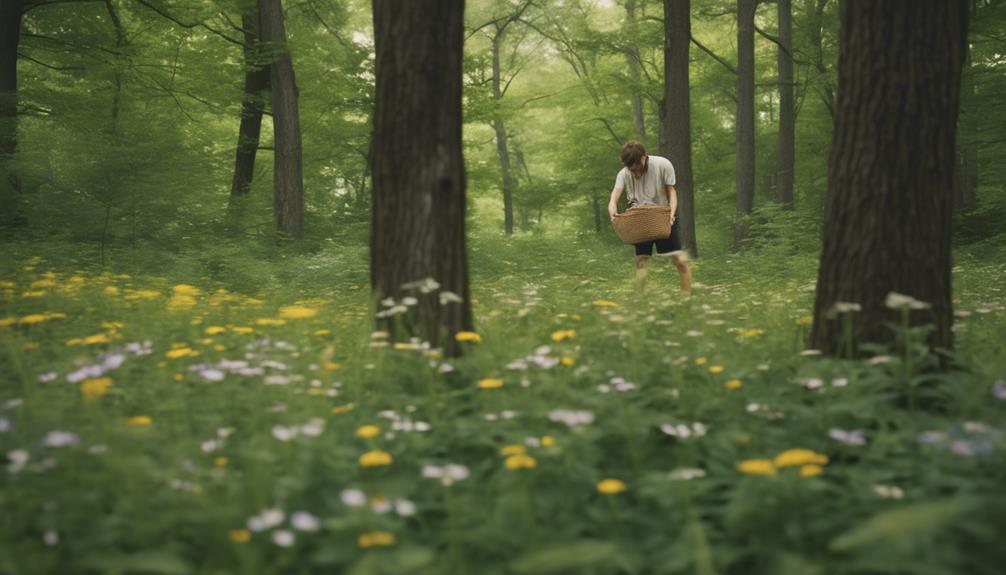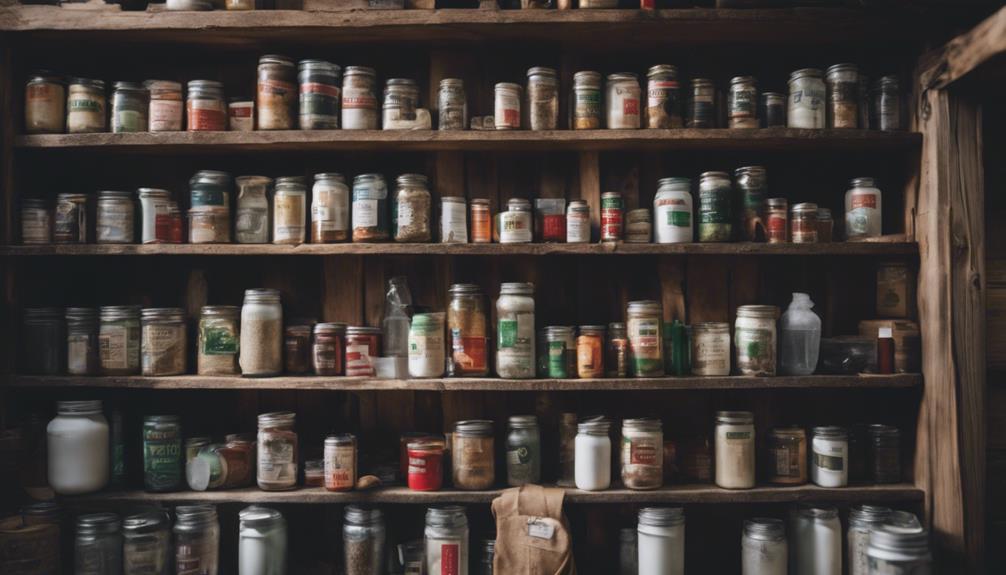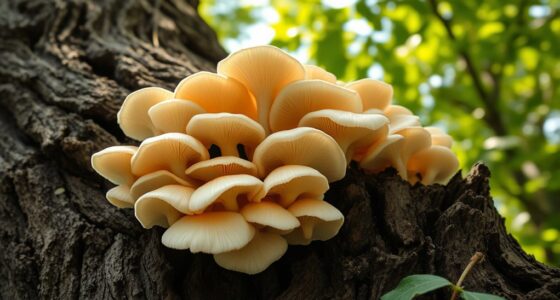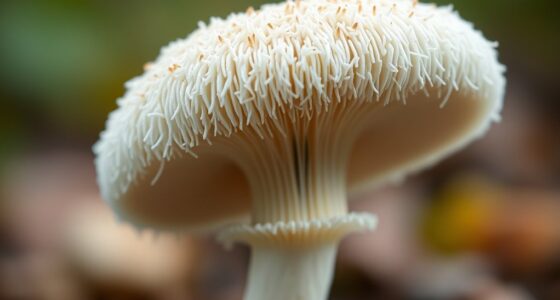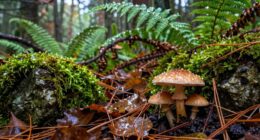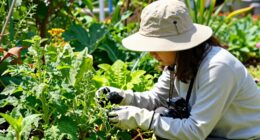You're interested in foraging in Illinois state parks, and wondering if it's allowed. The answer is yes, but with conditions. Foraging is permitted in designated areas, but regulations vary by location. You'll need to check with individual parks for specific rules and permits before you start searching for wild edibles. Some state parks have restrictions, while others may allow foraging in certain areas. Familiarize yourself with the park's rules and regulations to guarantee responsible harvesting. As you explore the world of foraging, you'll want to dig deeper into the specifics to make the most of your experience.
Key Takeaways
- Foraging is allowed in designated areas of Illinois state parks, but regulations vary between locations and individual park rules apply.
- Forest preserves are generally off-limits to foraging, but some county forest preserves may permit it with necessary permits or permissions.
- To forage responsibly, follow local regulations, obtain necessary permits, respect protected species and habitats, and practice sustainable harvesting.
- Identify the right species to hunt for, ensure they are allowed in the area, and research to correctly identify species before harvesting.
- Check with individual state parks for specific regulations and policies on foraging, as rules vary between locations.
Understanding Park Regulations
Before you head out to forage in Illinois state parks, it's important to familiarize yourself with the regulations governing the activity to avoid any misunderstandings or fines. The Illinois Department of Natural Resources manages state parks, and each park has its own set of rules and guidelines for foraging. Some parks may allow the collection of certain plants, berries, or mushrooms, while others might restrict or outright ban foraging. It’s crucial to research the specific foraging laws in state parks before visiting to ensure you’re in compliance with local regulations. Additionally, always practice sustainable foraging by taking only what you need and leaving enough for wildlife and future growth.
It's vital to check with individual state parks for their specific regulations, as they may vary from park to park. Additionally, forest preserves, which are separate from state parks, may have different regulations, so it's important to understand the rules of each location.
Remember, nature areas within state parks and forest preserves are typically off-limits for foraging activities. By respecting park regulations and guidelines, you'll help ensure the preservation of natural areas.
Always check with park authorities or the Department of Natural Resources for the most up-to-date information on foraging in Illinois state parks. By doing so, you'll be able to enjoy foraging in Illinois state parks while also protecting these valuable natural resources.
Foraging in Illinois State Parks

As you explore Illinois state parks, you'll find that foraging is allowed in designated areas where hunting is permitted, offering a unique opportunity to connect with nature while respecting the environment.
This natural foraging experience allows you to venture into the great outdoors, immersing yourself in the park's natural beauty. However, it's important to remember that some state parks may have restrictions on foraging in nature areas to protect the ecosystem. Additionally, rules can vary between locations, so it's vital to check with specific state parks for their policies on foraging for mushrooms, like morel hunting.
Unlike urban foraging, which often involves exploring through concrete jungles, Illinois State Parks offer a chance to forage in a more natural setting. By doing so, you'll not only connect with nature but also contribute to responsible foraging activities within legal boundaries.
Permitted Areas and Exceptions

Familiarizing yourself with the permitted areas and exceptions within Illinois state parks is crucial, as not all locations are open to foraging. Before you head out, make sure you're aware of the rules and regulations in place.
Here are some key things to keep in mind:
- Forest preserves are generally off-limits, but state parks in Illinois are legal locations for foraging.
- Some county forest preserves may allow foraging, but rules may vary between different locations.
- Certain areas within forest preserves and state parks may be designated as nature areas where hunting is prohibited.
- Winnebago County in Illinois has had no reported issues with foraging.
- Checking specific regulations for hunting in nature areas within forest preserves and state parks is important.
Remember to contact your local Illinois Department of Natural Resources office for specific information on the areas you plan to visit. They can provide you with the most up-to-date information on permitted areas and exceptions.
Always prioritize responsible foraging practices and respect the land and its rules.
Responsible Foraging Practices

When foraging in Illinois state parks, make sure to follow local regulations to guarantee responsible harvesting practices that promote conservation efforts. You should obtain necessary permits or permissions for foraging activities in designated areas within the state parks. This ensures that you're respecting protected species and habitats by avoiding disturbance during your foraging endeavors.
The Illinois Department of Natural Resources has specific guidelines for foraging in state parks, and it's important to educate yourself on these rules to promote conservation efforts. Additionally, practice sustainable harvesting by leaving some wild edibles behind to support ecosystem balance. This responsible approach will help maintain the delicate balance of the park's ecosystem.
Before you start foraging, familiarize yourself with the specific rules and guidelines for the specific park you plan to visit. Some parks may have unique regulations, so it's vital to check with the park's department or website for specific information.
Knowing What to Forage

Now that you're aware of the importance of responsible foraging practices, it's time to focus on identifying the right species to hunt for in Illinois state parks, such as the prized morel mushroom. When foraging in Illinois state parks, please consider what you're looking for and make sure it's allowed in the area you're in. Some species, like morels, are highly sought after, but others might be protected or even poisonous.
Here are some essential things to keep in mind when deciding what to forage:
- Research the species you're interested in and make sure you can identify them correctly.
- Check with park rangers or park websites to see if there are any specific regulations or restrictions on foraging in the area you plan to visit.
- Be aware of your surroundings and avoid areas that may have been contaminated or are otherwise unsafe.
- Only forage for species that are abundant and can sustain harvesting without a permit.
- Respect the environment and practice sustainable harvesting methods to make certain the ecosystem remains healthy.
Frequently Asked Questions
Is It Legal to Forage in Illinois State Parks?
You're wondering if it's legal to forage in Illinois State Parks, and the answer is yes, it is, but you'll need to adhere to park regulations and guidelines to promote sustainability and conservation of natural resources.
Can You Forage in Local Parks?
You might think foraging is a no-go, but surprisingly, you can forage in local Illinois parks, though rules vary by park and county, so it's essential you check with each park for specific regulations before you start foraging.
Can You Forage in Forest Preserves in Illinois?
You're wondering if you can forage in forest preserves in Illinois – generally, the answer is no, especially for morel hunting, but check with specific county forest preserves as some may allow it with certain regulations.
How Do You Know Where to Forage?
As you venture into the wild, imagine a treasure map unfolding before you. To know where to forage, you research specific park regulations, consult park staff, and join local groups to uncover hidden gems, ensuring a fruitful and responsible harvest. Equipped with knowledge and guided by experience, you develop an understanding of the foraging rules in state parks, fostering a sense of respect for the natural environment. These guidelines ensure that foragers like yourself contribute to the balance of ecosystems while enjoying the land’s seasonal bounty. By adhering to these rules and practicing sustainable techniques, you’ll preserve these resources for generations to come.
How to Forage in Illinois?
You'll need to research Illinois State Parks' specific regulations, obtain permission, and follow sustainable practices when foraging; some parks may have designated areas or prohibit it, so plan ahead and respect the ecosystem.
Conclusion
You've made it to the end of this foraging journey through Illinois state parks! Did you know that over 75% of Illinois' edible plants can be found in these parks?
As you venture out, remember to respect park regulations, forage responsibly, and know what you're picking. By following these guidelines, you'll not only enjoy the bounty of Illinois' wild edibles but also help preserve these natural wonders for future generations.
Happy foraging!

